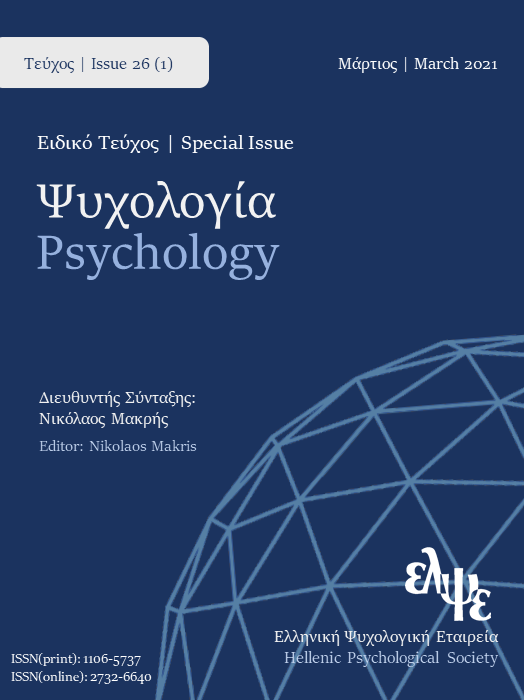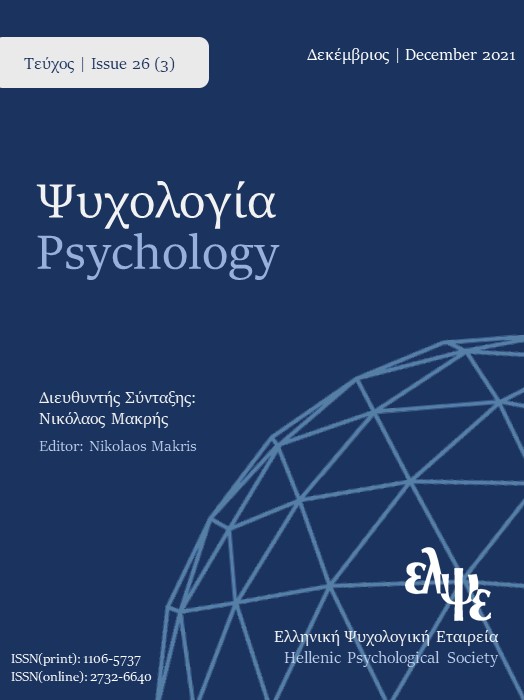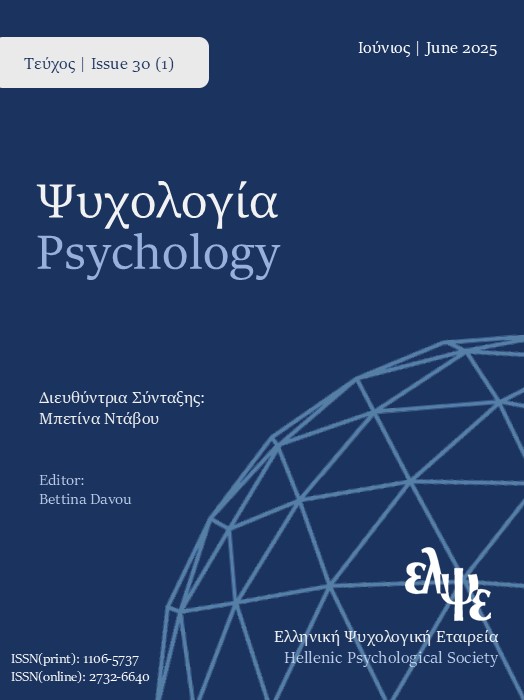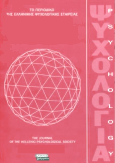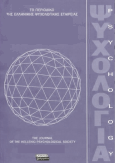Δημιουργία και έλεγχος μιας κλίμακας για την αξιολόγηση των προστατευτικών παραγόντων της ψυχικής ανθεκτικότητας των εκπαιδευτικών

Περίληψη
Η ψυχική ανθεκτικότητα των εκπαιδευτικών είναι εξαιρετικά σημαντική για την λειτουργικότητά τους. Ωστόσο, υπάρχουν ελάχιστες κλίμακες για τη μέτρησή της που να απευθύνονται ειδικά στους εκπαιδευτικούς, οι οποίες μάλιστα δεν περιλαμβάνουν πολλούς από τους σημαντικούς προστατευτικούς παράγοντες. Για τον λόγο αυτό, με βάση σχετικά ποιοτικά δεδομένα που συλλέχθηκαν σε προηγούμενη μελέτη, η παρούσα έρευνα σχεδιάστηκε με σκοπό την κατασκευή και την αξιολόγηση μιας πιο ολοκληρωμένης κλίμακας για τη μέτρηση των ατομικών και περιβαλλοντικών προστατευτικών παραγόντων της ψυχικής ανθεκτικότητας των εκπαιδευτικών. Στην έρευνα συμμετείχαν 407 εκπαιδευτικοί της πρωτοβάθμιας εκπαίδευσης. Για τον έλεγχο της συγκλίνουσας εγκυρότητας της νέας κλίμακας χρησιμοποιήθηκαν τα εργαλεία Multidimensional Teachers’ Resilience Scale (Mansfield & Wosnitza, 2015) και Τeachers’ Resilience Scale (Daniilidou & Platsidou, 2018). Ο έλεγχος της διακρίνουσας εγκυρότητας έγινε με το Maslach Burnout Inventory (Maslach & Jackson, 1986) και το Teachers’ Sense of Efficacy Scale (Tschannen-Moran & Woolfolk Hoy, 2001). Μέσα από μια σειρά παραγοντικών αναλύσεων και αναλύσεων με τη θεωρία απόκρισης στοιχείου με τη χρήση ενός μοντέλου βαθμιαίας απάντησης, καταλήξαμε στην τελική εκδοχή της Κλίμακας Προστατευτικών Παραγόντων της Ψυχικής Ανθεκτικότητας των Εκπαιδευτικών (ΚΠΠ-ΨΑΕ), η οποία περιλαμβάνει 29 δηλώσεις και αξιολογεί έξι προστατευτικούς παράγοντες: τις Αξίες και πεποιθήσεις, τη Συναισθηματική και συμπεριφορική επάρκεια, τη Σωματική ευεξία, τις Σχέσεις εντός σχολικού πλαισίου, τις Σχέσεις εκτός σχολικού πλαισίου και το Νομοθετικό πλαίσιο. Ο έλεγχος των ψυχομετρικών ιδιοτήτων καθώς και της διακρίνουσας και συγκλίνουσας εγκυρότητας της νέας κλίμακας έδειξαν ότι μπορεί να αξιοποιηθεί με ασφάλεια σε μελλοντικές έρευνες της ψυχικής ανθεκτικότητας των εκπαιδευτικών.
Λεπτομέρειες άρθρου
- Πώς να δημιουργήσετε Αναφορές
-
Δανιηλίδου Α., & Πλατσίδου Μ. (2022). Δημιουργία και έλεγχος μιας κλίμακας για την αξιολόγηση των προστατευτικών παραγόντων της ψυχικής ανθεκτικότητας των εκπαιδευτικών. Ψυχολογία: το περιοδικό της Ελληνικής Ψυχολογικής Εταιρείας, 27(3), 1–25. https://doi.org/10.12681/psy_hps.27034
- Ενότητα
- ΕΜΠΕΙΡΙΚΕΣ ΕΡΓΑΣΙΕΣ

Αυτή η εργασία είναι αδειοδοτημένη υπό το Creative Commons Attribution-ShareAlike 4.0 International License.
Το περιοδικό ΨΥΧΟΛΟΓΙΑ έχει υιοθετήσει μία πολιτική Platinum open-access. Τα έξοδα υποβολής, επεξεργασίας ή δημοσίευσης των εργασιών καλύπτονται από την Ελληνική Ψυχολογική Εταιρεία. Τα πνευματικά δικαιώματα των δημοσιευμένων εργασιών προστατεύονται από την άδεια 'Creative Commons Attribution-ShareAlike 4.0 International'. Οι Συγγραφείς διατηρούν τα Πνευματικά Δικαιώματα και χορηγούν στο περιοδικό το δικαίωμα της πρώτης δημοσίευσης. Η άδεια αυτή επιτρέπει σε τρίτους, να χρησιμοποιούν την εργασία σε οποιαδήποτε μορφή, με την προϋπόθεση της διατήρησης των διατυπώσεων που προβλέπονται στην άδεια σχετικά με την αναφορά στον αρχικό δημιουργό και την αρχική δημοσίευση στο περιοδικό ΨΥΧΟΛΟΓΙΑ. Επιπλέον, κάθε διανομή της εργασίας οφείλει να γίνεται με τους ίδιους όρους διανομής, δηλαδή με την ίδια άδεια Creative Commons.



